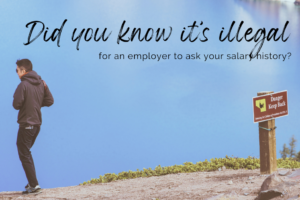|
|
Be careful who you get your career advice from
Not being able to get your dream job because you lack experience, and not being able to get experience because you can’t get the job.
The suggestion came not from the author of the post Darius Foroux, but instead from another Internet article he referenced, dating all the way back to 2009.
Now, I’ve already written on here about how most of the career advice floating around on the internet is outdated (by as much as 20 years!). So is the advice shared in the article referenced in Foroux’s post.
The post suggested those facing this catch-22 to gain experience by offering to work for free at a company for a short period of time.
If this sounds like a good idea to you, stop for a second and put yourself in the company’s shoes. Think about the legal implications this can cause for the company.
You can’t legally “do free work”
There are labor laws in the US that don’t allow for-profit companies to legally let people work for them for no pay. These laws are designed to protect you, the (potential) employee.
Note: even interns cannot work for free. They either have to earn academic credit (which they pay tuition for), or be paid as an employee for it to be legal.
Furthermore, in an internship the intern must receive a training and/or educational experience.
They can’t come in and just do crap work. If they do, the company has to pay the intern the same amount of money they would pay a regular employee to do the same tasks.
In other words, the internship has to benefit the intern, NOT the company.
This gets into another example of questionable career advice I’ve heard. Many entrepreneurs tell new entrepreneurs and start-ups:
“If you can’t afford to hire an assistant yet, just get an intern to help you…it’s free labor!”
Um, NO!
(Click here for the US Fair Labor Standards Act rules regarding interns, updated in January 2018.)
Question those who are willing to do what’s illegal
Because of labor laws in place to protect employees, most for-profit companies will not touch your offer to work for free with a 10-foot-pole.
They don’t want to risk getting sued by you down the road. And they don’t want to get in trouble for violating federal law.
And if they do take you up on your offer, you should question either:
1. Their knowledge of federal law.
It could be the person you make the offer to isn’t aware of the laws because he or she leaves this area of expertise up to the company’s HR department or legal department. Be concerned if they don’t want to first consult with HR or legal before saying yes to you.
2. Their ethics.
If they agree to knowingly break the law by letting you work for free under the table, you’ve got to wonder if their lack of ethics is common practice or part of the company-wide culture.
If so, do you really want to work for a company with this kind of reputation? Won’t it make you wonder what other unethical or questionable things the company does?
How to legally overcome the Catch-22
So how do you legally gain experience to land your dream job?
Here are my suggestions based on my combined 20 years of experience as a career coach (at both the university/college level and private practice level) and as someone who tries her best to keep up with the most up-to-date career info available:
1. Do a formal internship.
If you’re still in college or have gone back to college and can therefore sign up for academic credit, do an internship.
Make sure it’s with a company that has had a formal internship program in place for some time. Ask for references and talk to other interns to find out what their internship experience was like.
Go into it equipped with the knowledge of what your rights are as an intern. Understand what kind of experience you’re legally supposed to gain from the internship. (Click here to see the US Fair Labor Standards Act rules.)
Establish expectations before you begin the internship, both with your academic adviser and the on-site internship supervisor.
If those expectations aren’t being met early in your internship, have a conversation with your supervisor.
Include your academic adviser in the conversation if you feel the need for an advocate. Here or she is there to ensure you’re needs are being met.
2. Do a “returnship”
If you’re no longer in school but you’re wanting to change careers to something you have no experience in, there are some opportunities for you to do a “returnship.”
This is basically an internship but for mid-career and late-career professionals. (Think Robert De Niro’s character in the movie The Intern.)
Several companies offer such opportunities. These opportunities are typically paid, and therefore don’t require you to get academic credit.
To find a plethora of these type of internships, Google the following key phrases:
- “adult internships”
- “internships for mid-career professionals”
- “internships for middle aged”
You’ll also want to check out the resources listed in the appendix of Chip Conley’s book Wisdom @ Work (published 2018).
3. Volunteer at a non-profit
While you can’t legally work for free at a for-profit company, you can always volunteer with a non-profit organization.
Do a little research to see if there are any non-profits relevant to the industry you’re interested in going into.
Or, determine which non-profits have a need for a specific job function relevant to your dream job. Seek opportunities that will allow you to develop one or several necessary skill sets.
For example, if a non-profit needs someone to do their social media and you’re wanting to develop social media marketing skills, offer to help with their social media promotion.
4. Job shadow
If you can’t get access to hands-on resume-building experience, the next best thing is to shadow someone already in the job or field you’re interested in.
Research to find companies offering formal job shadowing programs. Also, ask companies without formal programs if they will allow you to shadow one of their employees.
A job shadowing request is less legally intimidating to companies than a request for you to work for free.
5. Find a mentor
While trying the above suggestions, you may want to pinpoint some people who could potentially become good mentors in your career.
You do this by building and fostering the relationships you made even after your hands-on experience is over.
Mentors can help you find additional ways to gain experience and can tell you what skills you need to develop.
6. Do the first thing Darius Foroux suggested
While I don’t agree with the second suggestion Foroux made in his post on how to get your dream job without experience, I do agree with his first suggestion:
“Be the person you would hire.”
What he means by this is, no matter what work you’re currently doing, always show professionalism.
You do this by having the right attitude and taking your career seriously.
It’s showing up early, asking questions, not wasting company time playing on your phone or gossiping with your co-workers, volunteering for new projects outside your current job description, serving on committees, staying late when needed to get the job done, etc.
When you do these things, you’ll develop more skills. Then when you find a company who hires more for skills than they do for experience, you’ll have those skills in your repertoire.
Final words
This post is not meant to slam Darius Foroux. I’ve liked several of his past articles and have shared them with my readers.
Instead it’s meant to teach you how to be more discerning and how to ask questions when it comes to all the different career advice available on the Internet.
No one, myself included, has any way of knowing all the legalities when it comes to every law for every industry. Nor can anyone know every company’s own policy regarding the suggestions outlined above.
When working with my clients, I always preface anything I’m not 100% sure about with,
“Double check that with your industry and the company’s policies.”
Ultimately, it is your responsibility to know as much as possible about your chosen industry.
This includes asking those who have the specialized knowledge about your specific industry’s hiring practices and company’s policies.
And don’t always rely on your first point of contact to know this info since it may not be their area of expertise. Ask them to check with their HR or legal department to verify any legalities or policies.
Follow the suggestions above and you’ll be able to gain the experience you need to make a smoother transition into your dream job!
Related Posts:
- How to Avoid Common Mistakes That Could Ruin Your Career
- Get Unstuck! How to Know When It’s Time to Invest In a Career Coach
- “Follow Your Heart” is Bad Advice. REALLY Bad Advice!






